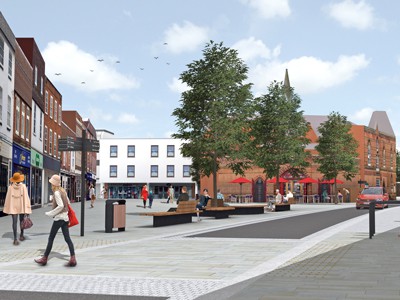Impact on the commercial property sector of changing consumer dynamics

It was an exciting 2018 for Wokingham with the £3.8 million joint Borough and town council market place refurbishment completing which along with the Peach Street development has given the town a real boost, writes Roger Reid of Haslams.
Despite significant investment, it is interesting to contemplate what the future looks like for the retail sector in Wokingham against a backdrop of accelerating online retail sales which reached 21.5% (source: office of national statistics) of all retail sales last year, a rise of 15% over the past decade.
Will we eventually end up with a market in which online sales overtake high-street sales?
On current trends this seems likely. When you also consider that high-street shops are primarily open when most people are at work (and the associated staffing cost that entails) compared with the convenience of a package delivered straight to your office or home, in my view there is likely to only be one outcome.
Can the Government step in to help businesses and keep our high streets from becoming obsolete?
It has long been suggested that the Government should look at reducing the business rates liabilities of local businesses to ‘level out’ the playing field with the big online retailers. However with business rates topping £30 billion in revenues for the treasury last year it is hardly surprising that they haven’t jumped at the chance to help retailers. Indeed post 2008 the Government hasn’t been incentivised to offer concessions to businesses to help them survive because landlords are having to pay the Government full empty business rates after three months of a property being empty. Previously a retailer going out of business would have cost the Government rates receipts. Not a very satisfactory situation for retailers.
There are some fantastic independent retailers in Wokingham and it is up to the local community to support them in order to keep a good standard of high-street amenity in what are challenging conditions in the retail sector. Otherwise there is a danger that our retail offering will become even more ‘chainy’ and homogenised than it already is, not just in Wokingham but across the whole country.
Could the Government increase taxes on the likes of Amazon instead?
Yes, but it would be naïve to suggest that increasing taxes for online retailers would somehow be a panacea for our high streets.
Central government must take accountability for Amazon only paying £1.7 million in taxes in 2017 despite profits almost trebling to £72.3m. This is despite the chancellor introducing a ‘diverted profits’ tax in 2015 which stopped the practice of companies channeling UK sales to countries outside the UK, in Amazon’s case Luxembourg. Yes large companies with plentiful resources are going to find tax loopholes and exemptions where they can but surely it can’t be that hard to make them pay their fair share?
On a national level the well publicised downfall of one of the UK’s major retail institutions, House of Fraser, demonstrates that the big retail players have to embrace e-commerce and move with the times. House of Fraser failed to do this, only belatedly investing £25m on a digital revamp in 2017 by which time the horse had well and truly bolted. Compare this to John Lewis who have invested heavily over the past decade to the point where e-commerce now accounts for one third of the company’s £4.5b turnover.
So the retail landscape is changing, what does this mean for commercial property?
One of the sub-sectors that has grown in tandem with online retailing is the last-mile delivery sector. With a reported 28% of the total cost of delivery coming from the last mile and greater expectations placed on next day or even on demand delivery it is crucial that businesses get this right. The demand for depots to support their ever expanding delivery routes is growing.
The loss of retail on the high street has inevitably led to increased take-up in the industrial sector. While I am reluctant to give yet more column inches to the ‘B’ word; against a backdrop of economic and political uncertainty there was a robust 5.6m sq ft of industrial take up in the Thames Valley in 2018. This effectively matched the strong levels recorded over the past couple of years. This resilient occupier activity is in part down to contraction on the high street and an increase in retail distribution centres to keep up with online demand.
Reid works in the business space agency team at Haslams Chartered Surveyors and deals primarily with industrial and office space.
For further information contact Reid at:













